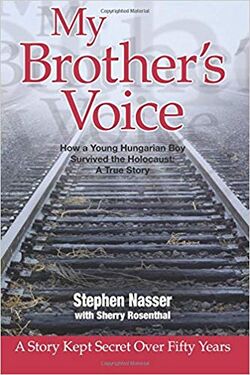Difference between revisions of "Stephen Nasser"
(Created page with "thumb|250px '''Stephen Nasser''' (M / Hungary, 1931). * <Nazi Ghettos> <Auschwitz> <Death March> * <Memoirs> ''My Brother's Voice'' (2003) ==Biogr...") |
|||
| Line 1: | Line 1: | ||
[[File:2003 Nasser.jpg|thumb|250px]] | [[File:2003 Nasser.jpg|thumb|250px]] | ||
'''Stephen Nasser''' (M / Hungary, 1931). | '''Stephen Nasser''' (M / Hungary, 1931), Holocaust survivor. | ||
* <Nazi Ghettos> <Auschwitz> <Death March> | * KEYWORDS : <Nazi Ghettos> <Auschwitz> <Death March> | ||
* | * MEMOIRS : ''My Brother's Voice'' (2003) | ||
==Biography== | ==Biography== | ||
| Line 15: | Line 15: | ||
"Stephen Nasser was 13 years old when the Nazis sent him and his family to Auschwitz. Stephen tells his story in the direct and optimistic language of a young boy ... Stephen Nasser somehow dug deep within his soul to survive the brutal and inhumane treatment his captors inflicted on the Jews. He was the only one of his family to survive--but the memory of his brother's dying words compelled him to live. Stephen's account of the Holocaust, told in the refreshingly direct and optimistic language of a young boy, appeals to both younger audiences and his contemporaries. Written in a straightforward, narrative style, Nasser avoids the cloying or maudlin language that characterizes some stories of the Holocaust. Perhaps it's for that reason readers will find his book one they won't forget--and one they recommend to others as a "must read."--Publisher description. | "Stephen Nasser was 13 years old when the Nazis sent him and his family to Auschwitz. Stephen tells his story in the direct and optimistic language of a young boy ... Stephen Nasser somehow dug deep within his soul to survive the brutal and inhumane treatment his captors inflicted on the Jews. He was the only one of his family to survive--but the memory of his brother's dying words compelled him to live. Stephen's account of the Holocaust, told in the refreshingly direct and optimistic language of a young boy, appeals to both younger audiences and his contemporaries. Written in a straightforward, narrative style, Nasser avoids the cloying or maudlin language that characterizes some stories of the Holocaust. Perhaps it's for that reason readers will find his book one they won't forget--and one they recommend to others as a "must read."--Publisher description. | ||
[[Category:Holocaust Children, 1931 (subject)|1931 Nasser]] | |||
[[Category:Holocaust Children's Memoirs (subject)|1931 Nasser]] | |||
[[Category:Auschwitz (subject)|1931 Nasser]] | |||
Latest revision as of 16:23, 14 September 2020
Stephen Nasser (M / Hungary, 1931), Holocaust survivor.
- KEYWORDS : <Nazi Ghettos> <Auschwitz> <Death March>
- MEMOIRS : My Brother's Voice (2003)
Biography
Stephen Nasser (b.1931) was born in 1931. He and his family were forced into a ghetto in 1943. They were transported to Auschwitz-Birkenau shortly after, where Nasser witnessed the murder of several relatives. He was liberated from a death train on April 30, 1945 by General Patton’s Third Army. After the war, he moved to the United States.
Book : My Brother's Voice (2003)
- My Brother's Voice: How a Young Hungarian Boy Survived the Holocaust (Las Vegas, Nev. : Stephens Press, 2003).
"Stephen Nasser was 13 years old when the Nazis sent him and his family to Auschwitz. Stephen tells his story in the direct and optimistic language of a young boy ... Stephen Nasser somehow dug deep within his soul to survive the brutal and inhumane treatment his captors inflicted on the Jews. He was the only one of his family to survive--but the memory of his brother's dying words compelled him to live. Stephen's account of the Holocaust, told in the refreshingly direct and optimistic language of a young boy, appeals to both younger audiences and his contemporaries. Written in a straightforward, narrative style, Nasser avoids the cloying or maudlin language that characterizes some stories of the Holocaust. Perhaps it's for that reason readers will find his book one they won't forget--and one they recommend to others as a "must read."--Publisher description.
